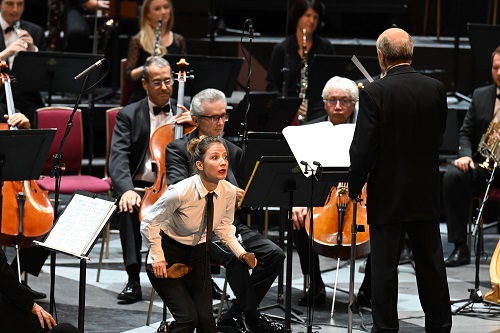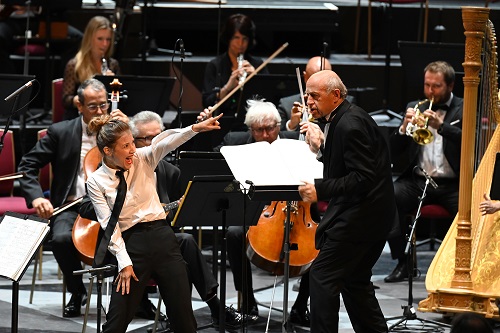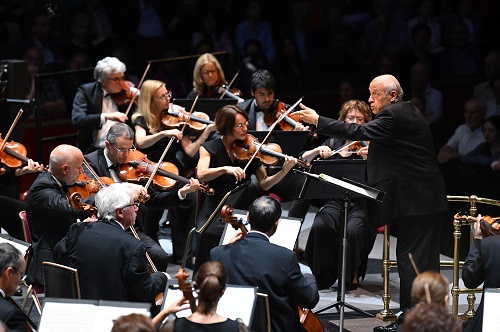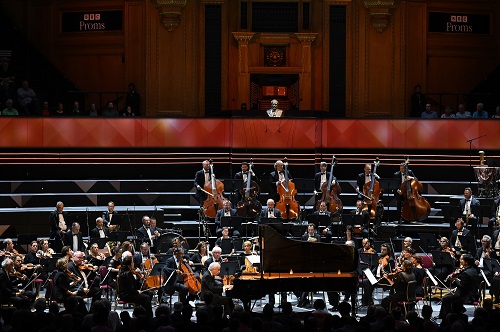The Budapest Festival Orchestra are a crack ensemble. And under Iván Fischer they can do everything that is possible – and nearly anything impossible, too. They brought with them to the Proms a György Ligeti premiere – alas just an excerpt from one of the composer’s greatest scores, his only opera, Le Grand Macabre: rarely has an opening piece been more fun, or brought the house down in quite the way it did. Of course, all of this may have had nothing to do with Ligeti’s opera and its bizarre world of creative sonorities and everything to do with the rather extraordinary soloist Anna-Lena Elbert.
Ligeti is a master of the absurd. Le Grand Macabre begins, for example, with an overture for twelve car horns; act two for one with doorbells. There is often no sense of order in the orchestra – anarchy runs amok, with individual instruments displaced or hidden from view. Ligeti’s preferred instrument, the bass trombone, will do what it is supposed to do – but from time to time it will belch, too. There is that typical colour in Ligeti’s score: a kaleidoscope of rhythms and tones, of clusters, but also the inverting and ridiculing of classical form. Although you aren’t, you do feel as if you are stuck on Tiberius’s Island of Capri.
If the spectre of human fallibility and decadence, and sadism and sexual excess, is central to Le Grand Macabre, then so is the rottenness of urban decay. Hidden behind the subtext of humour and vulgarity is also a world of hopelessness where vagrants live outside this dissolute playground. The great unanswered question of Ligeti’s opera is whether it is a vision of the apocalypse – or one almighty farce.
The piece performed at the Proms, Mysteries of the Macabre, arranged by Elgar Howarth in 1991, originally for trumpet and chamber orchestra, plays to a certain extent to the sexual reversal of roles. Just as Amanda and Armando, an opposite sex couple, are sung by two women, so the Chief of the Secret Political Police, Gepopo (a play on the German Gestapo), is here sung by a soprano (Puccini would never have considered such a thing). But this is pure Ligeti – it is so against type, so over the top, so dazzling and so insanely funny that it could only possibly be done by a soprano; a tenor becomes unimaginable in every possible way.

This scene is one of the few in the opera where Ligeti abandons his use of the vernacular and demotic language which makes Le Grand Macabre such an accessible and comprehensible – not to say human – work. The humour comes not just from the singer – who also needs to be an actress – but from the orchestra, too: rustling and scrunched up paper, whooping, exaggerated instrumental effects. It’s certainly possible from this particular Prom performance that one might not have picked up on Gepopo as being Chief of Police at all unless one knew the opera or had the booklet; Anna-Lena Elbert looked more as if she had stepped out of a 1930s silent comedy. The photograph in the booklet, however, of Susannah Howard as Gepopo from English National Opera’s 2009 production of Le Grand Macabre went full-on paratrooper. More, or less, obvious I’m not sure either.
Elbert gave such a remarkable and virtuoso performance I don’t think anyone cared what she was wearing. It is easy to see why Gepopo shares some similarities with Mozart’s Queen of the Night (a role in which Elbert excels); the vocal acrobatics, the precision of the high notes and the velocity of the notes have a shared difficulty for a soprano. Despite the huge differences in the musical language, the beauty of it and text is simply exquisite. Elbert made much out of the theatricality that Ligeti adapted from Michel de Ghelderode’s La ballade du Grande Macabre; the quicksilver repetitions at the end, slowing down like an unwinding toy until its limbs have literally stopped altogether, frozen in time, were superb – the meeting of the vocal and the physical in a Ligeti-infused symbiosis.
She remained entirely poised, despite running in circles through the orchestra, as if she were navigating a maze. Her voice would flash across lines, then snap at the endings as if a strike of lightening had hit the final consonant. Her rhythms could either be in symmetry with the orchestra, as smooth as honey; or, she would run alongside them with her voice like the teeth of a saw. When the language becomes nonsensical, Elbert sounded like an acrobat throwing out wordless sounds; they tumbled and rolled like unstoppable balls spinning downhill.

It was superlative, wonderfully crafted by Iván Fischer and his orchestra – and cheered to the rafters by an audience clearly taken with a soprano exceptionally gifted in giving us something truly artistic rather than simply another performance.
Béla Bartók’s Piano Concerto No.3, performed by Sir András Schiff, I found rather on the cool side. But this is Bartók at his most classical in one sense, in a concerto which, I think, lacks the sheer velocity, thrill and vividness of the spikier Piano Concerto No.1. The kind of lyricism of the Third does, however, suit Schiff’s manner of playing – his elegance, the homage to tonality, and restrained humour particularly. I thought, perhaps, the opening folk-inspired tune was a little on the dry side; if there was a lot of rhythm coming from within the orchestra it felt as if Schiff had forgotten what Hungarian colours were idiomatically supposed to sound like. What also seemed to be apparent was a rather blended tone; rather lush at times. I think Schiff rather held back on the dissonance (and there is some) when it arrived with a degree of hesitancy that felt just a little bit awkward.

The second movement, marked religioso, found Schiff much more in control – but given Bartók moves towards a more Bachian sound world it’s not surprising this should be the case. There was a more profound, noble tone here; phrasing was gorgeous – a rather surprising prelude to a very trenchant finale that had considerable muscularity and Schiff made very easy work of the closing pages.
The single work after the interval was Beethoven’s Eroica. Given the very tiered, wedding-cake platform of the Royal Albert Hall, there are multiple ways for a conductor to layout his orchestra. Iván Fischer chose to place his Budapest double basses (just six of them, against the usual eight) at the top at the back of the orchestra, and timpani a little higher to the right. He divided his violins antiphonally. The Budapest Festival Orchestra (whom I was interested to see from the booklet have the superb Korean violinist Suyoen Kim as their leader) have a warm, rich sound – but this is not one that is as distinctive as their near-neighbour, the Czech Philharmonic, nor as resonant or dark as the London Philharmonic whom I heard in Prom 36. But I think this orchestra is a bit of a chameleon when it comes to its sound – what you at first think it sounds like is largely hidden by the tempo taken by Iván Fischer (and he usually prefers not to hang around).

This Eroica was quite a good example of that. Most of the symphonies I have heard this season have started their opening chords in a very weak way, even if they haven’t really intended to – the orchestras just had no heft. Shostakovich’s Fifth, from Prom 16, was the perfect example of this. Iván Fischer, however, launched into those two full-thrust chords of the Allegro con brio with such monumental weight I began to ask myself why other orchestras simply couldn’t do this either. On balance, the first movement – perhaps feeling rather longer than the clock told me it was – felt craggy but I don’t think Fischer is the kind of Beethovenian to strap on his boots and hike up Everest to achieve resolution (by far the slower, more epic, if more scenic, route). Rather, peaks were hammered out with strokes of the axe that left no blood on the steel. He tends to execute chords with precision and shattering deftness – a very bloodless strike. The cleanness of the playing is often remarkable – the see-sawing between antiphonal violins balletic.
If the Allegro con brio had sometimes sounded a little lighter than expected, then the Marcia funebre was rather the opposite. Pacing is everything here – and Fischer took one of the most fluid tempos I have heard in an Eroica for years. As great as this music is, some conductors have no grip over it and the experience of hearing it can be insufferable; Fischer is not one of these. The string playing was magnificent – although perhaps I found the fugue a little shy of depth and richness, but this was only because Fischer gave the music so much fire. The Scherzo, too, burned with intensity and a native folk-inspired rhythmic bounce. The Finale was thrilling – the first set of variations skilfully drilled with metric precision, and just enough weight in the strings, the climax when it came measured in its volatility. The coda, like the cragginess of the opening chords, sounded like the collapse of rock down a cliff-face: cascading, and completely final.
Available on BBC Radio Sounds until 9th October 2023 and repeated on BBC Radio 3 on at 2pm on Monday 28th August 2023.
*Marc Bridle
György Ligeti – Mysteries of the Macabre; Béla Bartók – Piano Concerto No.3; Ludwig van Beethoven – Symphony No.3, ‘Eroica’.
Anna-Lena Elbert (soprano), Sir András Schiff (piano), Budapest Festival Orchestra, Iván Fischer (conductor)
Royal Albert Hall, London; Sunday 13th August 2023.
ABOVE: Anna-Lena Elbert, with the Budapest Festival Orchestra conducted by Iván Fischer (c) BBC / Chris Christodoulou